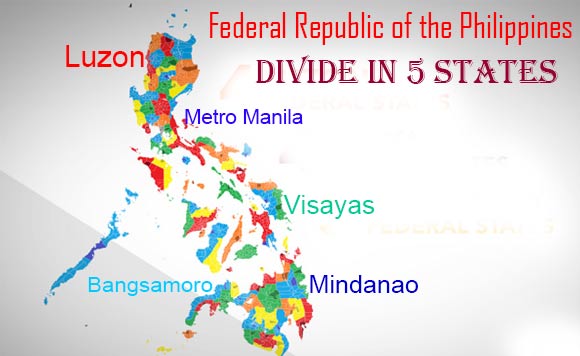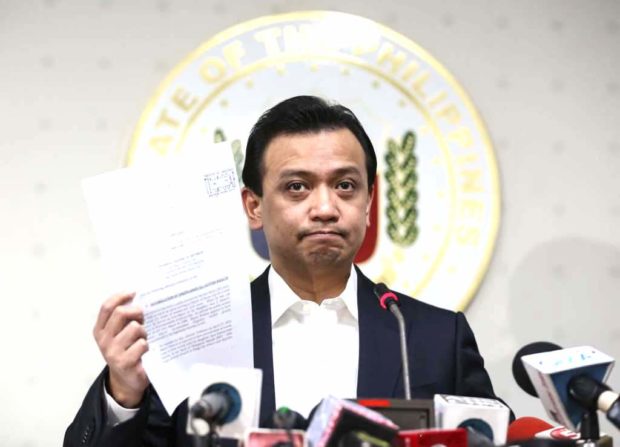
NEW YORK— In Manila last month for some work, I managed to interview Senator Antonio Trillanes IV, arguably the fiercest opposition solon—aside from Senator Leila de Lima, now in detention on what most believe are trumped-up drug charges. Senator Trillanes is a rather large thorn in President Duterte’s side. In June, the president, railing against the young senator in his native Cebuano, stated that “he believes that he’s the only tough one around because nobody fought him back. But there will come a day that someone will shoot him because he’s arrogant.”
Since this interview, Speaker Pantaleon Alvarez has been deposed and in his place is former president and now Congresswoman Gloria Macapagal Arroyo, firmly in Duterte’s camp.
(Here is Part 1 of the interview, edited for clarity.)
INQ: What are your views on President Duterte’s proposal for a federal government?
Senator Antonio Trillanes (SAT): The primary issue I’m concerned with is not the shift to a different form per se but it’s more of the ulterior motive behind the move because, based on our inside information Duterte is just using this to perpetuate himself in power and further expand his executive powers under this Constitution. He would be able to do that through the transitory provisions that would enable him to be in office beyond 2022.
INQ: You have no problem about federalism itself but it’s why he is doing it?
SAT: No. I havea problem with shifting to a federal form of government, but I won’t even go there because the ulterior motives are detrimental to the interests of our democracy, because if we start discussing the shift to any form of government then we have fallen into their narrative, that all of us are already discussing the charter change. They know that once everybody gets on board that cha-cha train, they will be able to control wherever it goes. That’s where the danger lies.
INQ: Is there a good chance that the Constituent Assembly will approve the shift to a federal form of government?
SAT: Based on the caucus we had in February to discuss charter change, at least 18 of the senators are not inclined to even convene a constituent assembly to open the Constitution if the ground rules are not clear specifically. The Senate would prefer the voting would be done separately, which is basically the essence of a bicameral form of government, so until that is settled, then we won’t even convene as a constituent assembly.

Sen. Antonio Trillanes. INQUIRER FILE
INQ: If the Constituent Assembly is convened, it will be made up of both houses?
SAT: Yes. That is why this idea of Speaker Alvarez, that they go it alone is preposterous and outright unconstitutional.
INQ: What is the reason for him to say, to go it alone?
SAT: He’s saying that the language of the Constitution is not explicit, to have a joint session, therefore he’s saying you can change the Constitution unilaterally, but the term used in the Constitution is Congressand Congress is made up of two houses. But they’re confident they’ll be able to get the Supreme Court nod later on, that’s why they’re willing to ram it down everyone’s throat.
INQ: How are you and other senators pushing back?
SAT: Well, the primary objective right now is to sound the alarm. Let the people know about the dangers of this cha-cha being proposed by Alvarez and company. Make no mistake. This has the full blessing of Mr. Duterte, because it serves his purpose well, so we need to raise the awareness of the public through the media so that they can start engaging in the discourse. If we get enough pushback, they may have second thoughts.
INQ: But say it [Constituent Assembly] goes through, what are your countermeasures?
SAT: Well, it should be a red line, OK?
INQ: Can you be more specific?
SAT: Let’s define the red line first. If Alvarez and company push forward with the cha-cha, without the participation of the Senate then I don’t think the senators will take that sitting down. We will be calling on the people to expose the brazen violation of the Constitution committed by the House of Representatives. Then we will see if that is a red line for the Filipino people. If not, then somebody will file with the Supreme Court and we will have to wait for their decision. If the Supreme Court decides that the process is constitutional, then that is a red line because you have the Supreme Court now brazenly violating the Constitution itself that it’s supposed to uphold. These are red lines but ultimately it depends on the limits of the people.
INQ: What about the Catholic Church? Have there been attempts to work with the Catholic Bishops Conference of the Philippines, for instance?
SAT: Not necessarily with the CBCP but with individual bishops and lay organizations. There is now a consolidation primarily brought about by Duterte’s self-inflicted wounds [his God-is-stupid remarks] so those incidents opened the eyes of a lot of people. For some that was the breaking point, so now that really expanded the whole opposition movement to Rodrigo Roa Duterte.
INQ: Clearly the Duterte forces will try to push through the Constituent Assembly and cha-cha. What about the military, given that you were from the military?
SAT: Well, ultimately, in relation to the earlier question, do we expect mass mobilization should the Supreme Court favor the Duterte-Alvarez move? Well, we have to mobilize. We won’t wait for people to move, we’ll spearhead the mobilization. By then we are hoping the level of awareness will at that level be enough for them to take action.
Now to answer the question about the military, I still maintain my position that the AFP is a microcosm of Philippine society, so if there are people in society who are disgusted with the situation now, then it follows that the officers of the AFP will feel the same. Historically, they follow where the people are. If that red line is crossed and the people will say collectively enough is enough, I am confident the AFP will withdraw its support from this administration.
INQ: Do you get a sense of younger officers growing dissatisfied with the current administration?
SAT: Based on our engagement with them, they have their own reasons for agitation. For junior officers, especially for those who were involved in the siege of Marawi, there were some grumblings, they felt that the situation shouldn’t have been that way.
INQ: What does that mean?
SAT: They are voicing out some concerns that their leaders didn’t handle that situation better. As for mid-ranking and senior officers, let’s say in the Navy they’re agitated by the frigate controversy, the weak response of the administration with regards the West Philippine Sea issue, with the modernization funds as well, that caught senior defense officials and Malacañang dipping their fingers into modernization funds. Because again Malacañang and senior defense officials are pushing for the procurement of certain items that they feel are not needed. But those are the specific sources of agitation. But the general source is the apparent immoral, or amoral, authority of their Commander-in-Chief.
(To be continued)
Copyright L.H. Francia 2018







